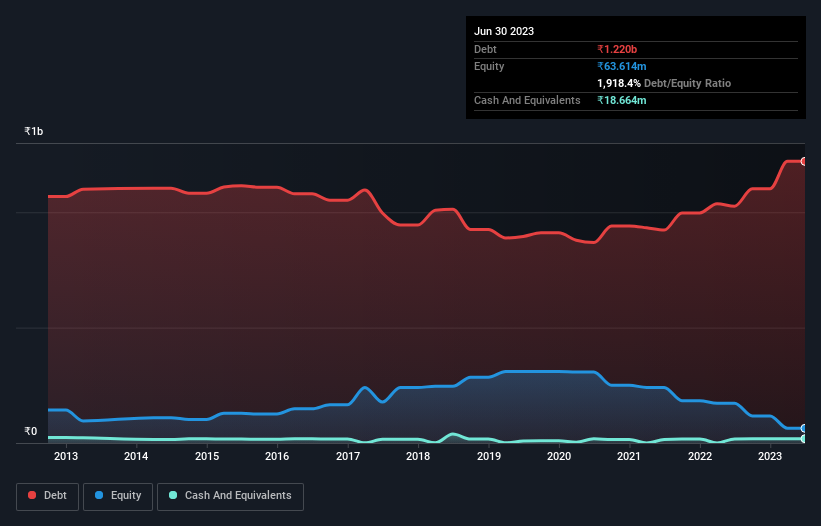- India
- /
- Paper and Forestry Products
- /
- NSEI:MALUPAPER
Is Malu Paper Mills (NSE:MALUPAPER) Using Too Much Debt?

David Iben put it well when he said, 'Volatility is not a risk we care about. What we care about is avoiding the permanent loss of capital.' It's only natural to consider a company's balance sheet when you examine how risky it is, since debt is often involved when a business collapses. Importantly, Malu Paper Mills Limited (NSE:MALUPAPER) does carry debt. But is this debt a concern to shareholders?
When Is Debt A Problem?
Generally speaking, debt only becomes a real problem when a company can't easily pay it off, either by raising capital or with its own cash flow. In the worst case scenario, a company can go bankrupt if it cannot pay its creditors. However, a more usual (but still expensive) situation is where a company must dilute shareholders at a cheap share price simply to get debt under control. Of course, debt can be an important tool in businesses, particularly capital heavy businesses. When we examine debt levels, we first consider both cash and debt levels, together.
See our latest analysis for Malu Paper Mills
How Much Debt Does Malu Paper Mills Carry?
You can click the graphic below for the historical numbers, but it shows that as of March 2023 Malu Paper Mills had ₹1.22b of debt, an increase on ₹1.03b, over one year. Net debt is about the same, since the it doesn't have much cash.

A Look At Malu Paper Mills' Liabilities
The latest balance sheet data shows that Malu Paper Mills had liabilities of ₹1.30b due within a year, and liabilities of ₹140.9m falling due after that. On the other hand, it had cash of ₹18.7m and ₹226.2m worth of receivables due within a year. So its liabilities outweigh the sum of its cash and (near-term) receivables by ₹1.20b.
This deficit casts a shadow over the ₹583.4m company, like a colossus towering over mere mortals. So we'd watch its balance sheet closely, without a doubt. At the end of the day, Malu Paper Mills would probably need a major re-capitalization if its creditors were to demand repayment. There's no doubt that we learn most about debt from the balance sheet. But you can't view debt in total isolation; since Malu Paper Mills will need earnings to service that debt. So when considering debt, it's definitely worth looking at the earnings trend. Click here for an interactive snapshot.
In the last year Malu Paper Mills's revenue was pretty flat, and it made a negative EBIT. While that's not too bad, we'd prefer see growth.
Caveat Emptor
Importantly, Malu Paper Mills had an earnings before interest and tax (EBIT) loss over the last year. Indeed, it lost ₹47m at the EBIT level. Considering that alongside the liabilities mentioned above make us nervous about the company. It would need to improve its operations quickly for us to be interested in it. Not least because it had negative free cash flow of ₹106m over the last twelve months. So suffice it to say we consider the stock to be risky. There's no doubt that we learn most about debt from the balance sheet. But ultimately, every company can contain risks that exist outside of the balance sheet. Case in point: We've spotted 3 warning signs for Malu Paper Mills you should be aware of.
If you're interested in investing in businesses that can grow profits without the burden of debt, then check out this free list of growing businesses that have net cash on the balance sheet.
New: Manage All Your Stock Portfolios in One Place
We've created the ultimate portfolio companion for stock investors, and it's free.
• Connect an unlimited number of Portfolios and see your total in one currency
• Be alerted to new Warning Signs or Risks via email or mobile
• Track the Fair Value of your stocks
Have feedback on this article? Concerned about the content? Get in touch with us directly. Alternatively, email editorial-team (at) simplywallst.com.
This article by Simply Wall St is general in nature. We provide commentary based on historical data and analyst forecasts only using an unbiased methodology and our articles are not intended to be financial advice. It does not constitute a recommendation to buy or sell any stock, and does not take account of your objectives, or your financial situation. We aim to bring you long-term focused analysis driven by fundamental data. Note that our analysis may not factor in the latest price-sensitive company announcements or qualitative material. Simply Wall St has no position in any stocks mentioned.
About NSEI:MALUPAPER
Slight and slightly overvalued.
Market Insights
Community Narratives




